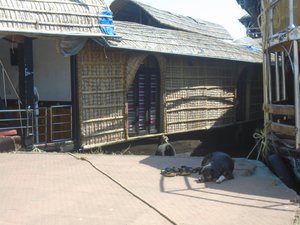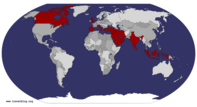Advertisement
Published: February 18th 2016

 Kochi, India
Kochi, India
House boat with dog.Kochi, India. February 5, 2016
Kochi is the original name of Cochin, and it has returned to that name, as Bombay returned to being Mumbai. The last vesiges of the British occupation are most evident in their rigid, unweildly and deeply annoying bureaucracies.
The snafus of yesterday's immigration experience in Mangalore were repeated almost exactly in Kochi. As we were finally disembarking a full hour and a half later than expected, and grumbling at the lost time, we were fortunate to hear the captain's instructions to security that departure had been extended to allow the excursions to keep to their itineraries. 4:30pm was the original all aboard; we were back by 5:30, and the last ship excursion returned at 6pm. Many people had already left for the day and were not pleased to find that they had returned to the ship almost two hours earlier than necessary.
Everything that Susan recommended in Kochi was bang on, and we had the time and the guide to touch on almost all of it.
Again, Lijo met us on the dock to introduce our driver and guide. He took the train down the evening before. Our guide was Sreekhand (well,

 Kochi, India
Kochi, India
The houseboats are quite elaborate. We sailed on the Vembanad Lake. it sounded like that), an economics graduate with little background in tourism, but a font of enthusiastic knowledge on the area.
After quite a long drive, with the standard adrenaline-charged traffic, we came to the river and lake system comprising the massive rice paddies of the southern region, which is called the Rice Bowl in Hindustani.
Here we found a great number of houseboats - long and narrow. Beautiful wood floors, some two stories, with palm-leaf thatched or rattan roofs, rope-and-pulley operated windows and skylights, a lovely front deck with chairs and tables and benches along the gunwales, a less lovely back one (generator, water pump, spare parts, laundry) and two full bedrooms each with full bathrooms (open shower, no tub).
We doffed our shoes as we had to traverse other boats to get to ours. This was impossible for our companion with the walker, who had been told that her limited mobility would be no problem. There was no way she could clamber aboard and then traverse the other boats, so we had to back the boat out and get a few others to shift left and right a bit, until we could nose up to

 Kochi, India
Kochi, India
Lunch aboard the houseboat. The fish were delicious, albeit quite boney! the concrete seawall where she was able to step on board. Still precarious for her, and no handholds other than crew and passengers, but she made a valiant effort and did not complain when she fell on her butt trying to make that last step onto the boat. The crew made it up to her, though, and treated her royally in apology.
We cruised for a couple of hours and were served a lovely lunch of vegetable and chicken curries, pickled things, cabbage salad and rice, a breaded sort of whole perch (with really niggley bones), papadums and so on, all prepared while we cruised.
We passed mile after mile of dikes separating the tidal rivers and lakes from the rice paddies. At intervals, when the brackish water flows out at low tide and the freshwater flows through the waterways, they open the dikes to flood the paddies.
Some of the berms are quite wide, and many homes, stores and businesses occupy any empty land that will support it. Big and small boats ply the waters carrying building materials and other goods, fruit, vegetables, and people. Women did laundry on the shoreline and children played in the

 Kochi, India
Kochi, India
Upscale street shops. Nicely displayed. water, chasing geese and waving at us.
In the middle of the lake, a kilometer from shore, we saw heads bobbing in the water. A nearby canoe kept watch. Men were fishing by hand and with small nets while floating in the water. When they tired, they would upend the small pole floating near them in the water and drive one end into the lake bed ten feet below and use that as support to rest for a bit. The canoe would come over and take their catch, and they would begin diving again, staying down for long periods of time like the cormorants fishing alongside the men, but unlike the cormorants, surfacing close to where they had gone under.
Crows and herons and egrets are everywhere, with a multitude of smaller birds filling the trees. Many mongrels and some mangy cats, but no other ground animals seen in this rural, but populous area.
Back to the dock after paying about $3US each for lunch and cruise.
The drive back to town was a little more exciting than the drive out, as traffic was less dense and drivers a bit more acrobatic, taking advantage of the

 Kochi, India
Kochi, India
Chinese fishing nets. more frequent, but no less teeny gaps between vehicles. Their relatively low speeds and hyperawareness seems to save many of them. Despite a multitude of very close calls, we never saw an actual collision. We did, however, see the aftermath of some - front ends of these cheaply made cars crumple like cardboard, so the damage looks much worse than the fairly light force of contact would warrant. Several ambulances whipped by, with opportunistic drivers falling in behind to gain distance to the next gridlock.
Low speed or not, the sheer multitude of two-wheeled motors must result in a lot of flesh mangling, as helmets are an annoyance. In this heat, leathers are out of the question. So, sandals and saris, tank tops and shorts or jeans or polyester dress pants are often the only protection from a roll on the asphalt, or a tumble under a bus.
Helmets are a political football in themselves, representative of a multitude of anti-government sentiment. The local communists, presently in power in this state, stage frequent protests involving flag-waving scooter and motorcycle convoys, all drivers and passengers in violation of the law by refusing to wear helmets in protest of government

 Kochi, India
Kochi, India
Fishing dude. He was the one who took pix with our camera. overregulation. These are the same folks that want a return to the traditional ways, with less government interference and the imposition of Sanskrit as the official language. Kinda like some American Republicans with their hatred of bureaucracy and social responsibility, based on a fundamentalist evangelicalism and rejection of anything foreign. Ghandi would be shocked and amused at this odd civil disobedience.
Sreekhand speaks knowledgeably and frankly on the poor government which often seems to act against its own interest, and frequently against the interests of the people. A litany of government errors has led the ruling bureaucracy to openly admit to them, which they call, "Historical blunders."
The language of horns. It is very situational, but has its own dialect. A quick parp can mean "passing you," or just "careful, I'm right here!" A double means, "Don't do that," or, "Here I go," and an extended blast means the same as anywhere else, "You are dead wrong, moron, get out of my way!" Sreekhand says three things are needed to drive in India; a good horn, good brakes, and good luck.
An intersection named, inexplicably, X-Ray Junction. Sreekhand guesses that one of the first X-ray machines on

 Kochi, India
Kochi, India
Pulling up the nets!the west coast was here for a while.
To Fort Cochin, where the various conquering empires built, remodeled and rearranged the harbour defences according to the technologies of the day. Phoenicians, Greeks and Romans, Moors and Dutch, Portuguese and British all played out the conflicts of their day for control of the Spice Routes.
An ancient Christian church contains the (tiny) tomb of Vasco de Gama, whose bones were relocated home centuries ago. I am not tall, but i could not fit into that box unless my shins were removed.
Then to a more upscale merchant street, with higher quality tourist junk. Sreekhand bluntly told us he gets a commission if we buy something. Refreshing after the devious practices of some of the places we have visited. We found a better-quality image of elephant-headed Ganesha, our favoured Hindu god. Bargained hard to get them down to $90US for this ornate hand-carved (perhaps) image. It couldn't have cost them more than $10, but it is very nice work. If it doesn't crack, we will treasure it. They claimed it was carved from one piece and water-treated before carving so it won't crack in the Canadian cold, something we sadly saw happen to friends' ritual masks from the Baruka tribe in the jungles of Costa Rica.
The Chinese fishing nets are a vestige of when the Chinese population here was much larger. Now run by locals, these are huge dipping nets, counterweighted with large rock and manipulated with ropes and pulleys. From the pier, the nets dip into the sea when the tide is running high and scoop out hundreds and thousands of fish for the local markets.
We were there at low tide, and the inactive crew was happy to see our guide approach, as they know him well. He arranged our touristy participation, we got to walk out onto the rickety pier to take pictures and inspect the gear, and smile and nod with the crew who were eager to show us how things worked. The most fun was having the crew take our cameras and shoot pictures of us while we hauled up the (empty) nets.
Our guide had promised that the final stop would be the most memorable, and one which our shipmates would most likely not see. We were fortunate to be there while a huge Hindu festival was going on, and we arrived at a giant open area with a gigantic covered stage surrounded by hundreds and hundreds of worshippers. Under the roof were dozens of drummers, and four elephants with beautifully ornate costumes.
I marveled at the ability of the mahouts to control their massive charges, until I went around back and was able to see the chains which hobbled them, rendering them unable to move their feet in any more than a small shuffle. The drummers drum for three hours, which means the elephants stand motionless for even more time, which made me think of Ganesha as the remover of obstacles and the personification of luck. Not for elephants, nope.
For the evangelicals on board, it is all heretical heathenism, idol-worship and a cacophony which surely offends the ears of God. They are not amused when I contribute, "Make ye a joyful noise unto the Creator, eh?"
Advertisement
Tot: 0.057s; Tpl: 0.013s; cc: 11; qc: 23; dbt: 0.0325s; 1; m:domysql w:travelblog (10.17.0.13); sld: 1;
; mem: 1.1mb











Ellie&Willem
non-member comment
Cruise m.s.Rotterdam
Love to read your interesting and humoristic travelogue from your cruise on the m.s.Rotterdam. Looking forward to your stories when in Willem's country of birth Indonesia.